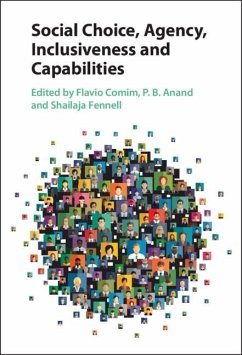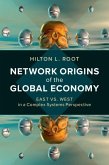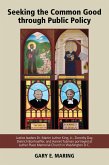Social Choice, Agency, Inclusiveness and Capabilities (eBook, ePUB)
Redaktion: Comim, Flavio; Fennell, Shailaja; Anand, P. B.
102,95 €
102,95 €
inkl. MwSt.
Sofort per Download lieferbar

51 °P sammeln
102,95 €
Als Download kaufen

102,95 €
inkl. MwSt.
Sofort per Download lieferbar

51 °P sammeln
Jetzt verschenken
Alle Infos zum eBook verschenken
102,95 €
inkl. MwSt.
Sofort per Download lieferbar
Alle Infos zum eBook verschenken

51 °P sammeln
Social Choice, Agency, Inclusiveness and Capabilities (eBook, ePUB)
Redaktion: Comim, Flavio; Fennell, Shailaja; Anand, P. B.
- Format: ePub
- Merkliste
- Auf die Merkliste
- Bewerten Bewerten
- Teilen
- Produkt teilen
- Produkterinnerung
- Produkterinnerung

Bitte loggen Sie sich zunächst in Ihr Kundenkonto ein oder registrieren Sie sich bei
bücher.de, um das eBook-Abo tolino select nutzen zu können.
Hier können Sie sich einloggen
Hier können Sie sich einloggen
Sie sind bereits eingeloggt. Klicken Sie auf 2. tolino select Abo, um fortzufahren.

Bitte loggen Sie sich zunächst in Ihr Kundenkonto ein oder registrieren Sie sich bei bücher.de, um das eBook-Abo tolino select nutzen zu können.
- Geräte: eReader
- mit Kopierschutz
- eBook Hilfe
- Größe: 6.83MB
- FamilySharing(5)
Andere Kunden interessierten sich auch für
![The anthropology of power, agency, and morality (eBook, ePUB) The anthropology of power, agency, and morality (eBook, ePUB)]() The anthropology of power, agency, and morality (eBook, ePUB)93,95 €
The anthropology of power, agency, and morality (eBook, ePUB)93,95 €![Free Trade and Faithful Globalization (eBook, ePUB) Free Trade and Faithful Globalization (eBook, ePUB)]() Amy ReynoldsFree Trade and Faithful Globalization (eBook, ePUB)14,95 €
Amy ReynoldsFree Trade and Faithful Globalization (eBook, ePUB)14,95 €![Investor States (eBook, ePUB) Investor States (eBook, ePUB)]() Benjamin M. HunterInvestor States (eBook, ePUB)16,95 €
Benjamin M. HunterInvestor States (eBook, ePUB)16,95 €![Network Origins of the Global Economy (eBook, ePUB) Network Origins of the Global Economy (eBook, ePUB)]() Hilton L. RootNetwork Origins of the Global Economy (eBook, ePUB)23,95 €
Hilton L. RootNetwork Origins of the Global Economy (eBook, ePUB)23,95 €![Boosting Competitiveness Through Decentralization (eBook, ePUB) Boosting Competitiveness Through Decentralization (eBook, ePUB)]() Aylin TopalBoosting Competitiveness Through Decentralization (eBook, ePUB)34,95 €
Aylin TopalBoosting Competitiveness Through Decentralization (eBook, ePUB)34,95 €![Seeking the Common Good through Public Policy (eBook, ePUB) Seeking the Common Good through Public Policy (eBook, ePUB)]() Gary E. MaringSeeking the Common Good through Public Policy (eBook, ePUB)3,99 €
Gary E. MaringSeeking the Common Good through Public Policy (eBook, ePUB)3,99 €![Regional Policy (eBook, ePUB) Regional Policy (eBook, ePUB)]() Norbert VanhoveRegional Policy (eBook, ePUB)34,95 €
Norbert VanhoveRegional Policy (eBook, ePUB)34,95 €-
-
-
Produktdetails
- Verlag: Cambridge University Press
- Erscheinungstermin: 29. Februar 2024
- Englisch
- ISBN-13: 9781009232692
- Artikelnr.: 70914247
Dieser Download kann aus rechtlichen Gründen nur mit Rechnungsadresse in A, B, BG, CY, CZ, D, DK, EW, E, FIN, F, GR, HR, H, IRL, I, LT, L, LR, M, NL, PL, P, R, S, SLO, SK ausgeliefert werden.
- Herstellerkennzeichnung Die Herstellerinformationen sind derzeit nicht verfügbar.
Introduction: social choice, agency, inclusiveness and capabilities Flavio
Comim, P. B. Anand and Shailaja Fennell; 1. The many facets of social
choice theory Wulf Gaertner; 2. Beyond capabilities? Sen's social choice
approach Flavio Comim; 3. Examining the challenge of communication in
diffusing innovative education programmes: an analysis drawing on public
choice, social choice and capability framings Shailaja Fennell; 4. Nudging
the capabilities for a sustainable city? When the libertarian paternalist
meets the paretian liberal P. B. Anand; 5. Strengthening research capacity
in Northern Nigeria: identity, choice and capability Michael Watts, Nafisa
Waziri and Oladele Akogun; 6. In defence of inclusiveness: on sustainable
human development, capability and indicators of progress Mozaffar
Qizilbash; 7. Exploring sen on self-interest and commitment Gay Meeks; 8.
Incorporating an emotional dimension in the capability approach John
Cameron; 9. Sufficiency reexamined Jay Drydyk; 10. Adaptive preferences vs
Internalisation in deprivation: conceptual comparison between the
capabilities approach and the self-determination theory Tadashi Hirai; 11.
Capabilities and relational ontologies: Sen and indigenous theories of
development Ana Estefania Carballo; 12. Creativity and capabilities: a
problem of change and uncertainty? Jonathan Warner; 13. 'Measuring the
Independence of 'Dependent' persons based on the capability approach'
Hideyuki Kobayashi and Reiko Gotoh; 14. Indigenous challenges to the
capability approach: a relational ontology of community and sustainability
Ana Estefania Carballo; 15. Situating the family within the capabilities
framework: a collective conversion factor. The role of the household
configuration in the quality of life in Mali Claudine Sauvain-Dugerdil and
Siaka Cissé; 16. An ethical perspective on the UK's improving lives: the
future of work, health and disability Jacques Tamin; 17. Public services as
conversion factors: exploring the theory and practice Richard Brunner and
Nick Watson.
Comim, P. B. Anand and Shailaja Fennell; 1. The many facets of social
choice theory Wulf Gaertner; 2. Beyond capabilities? Sen's social choice
approach Flavio Comim; 3. Examining the challenge of communication in
diffusing innovative education programmes: an analysis drawing on public
choice, social choice and capability framings Shailaja Fennell; 4. Nudging
the capabilities for a sustainable city? When the libertarian paternalist
meets the paretian liberal P. B. Anand; 5. Strengthening research capacity
in Northern Nigeria: identity, choice and capability Michael Watts, Nafisa
Waziri and Oladele Akogun; 6. In defence of inclusiveness: on sustainable
human development, capability and indicators of progress Mozaffar
Qizilbash; 7. Exploring sen on self-interest and commitment Gay Meeks; 8.
Incorporating an emotional dimension in the capability approach John
Cameron; 9. Sufficiency reexamined Jay Drydyk; 10. Adaptive preferences vs
Internalisation in deprivation: conceptual comparison between the
capabilities approach and the self-determination theory Tadashi Hirai; 11.
Capabilities and relational ontologies: Sen and indigenous theories of
development Ana Estefania Carballo; 12. Creativity and capabilities: a
problem of change and uncertainty? Jonathan Warner; 13. 'Measuring the
Independence of 'Dependent' persons based on the capability approach'
Hideyuki Kobayashi and Reiko Gotoh; 14. Indigenous challenges to the
capability approach: a relational ontology of community and sustainability
Ana Estefania Carballo; 15. Situating the family within the capabilities
framework: a collective conversion factor. The role of the household
configuration in the quality of life in Mali Claudine Sauvain-Dugerdil and
Siaka Cissé; 16. An ethical perspective on the UK's improving lives: the
future of work, health and disability Jacques Tamin; 17. Public services as
conversion factors: exploring the theory and practice Richard Brunner and
Nick Watson.
Introduction: social choice, agency, inclusiveness and capabilities Flavio
Comim, P. B. Anand and Shailaja Fennell; 1. The many facets of social
choice theory Wulf Gaertner; 2. Beyond capabilities? Sen's social choice
approach Flavio Comim; 3. Examining the challenge of communication in
diffusing innovative education programmes: an analysis drawing on public
choice, social choice and capability framings Shailaja Fennell; 4. Nudging
the capabilities for a sustainable city? When the libertarian paternalist
meets the paretian liberal P. B. Anand; 5. Strengthening research capacity
in Northern Nigeria: identity, choice and capability Michael Watts, Nafisa
Waziri and Oladele Akogun; 6. In defence of inclusiveness: on sustainable
human development, capability and indicators of progress Mozaffar
Qizilbash; 7. Exploring sen on self-interest and commitment Gay Meeks; 8.
Incorporating an emotional dimension in the capability approach John
Cameron; 9. Sufficiency reexamined Jay Drydyk; 10. Adaptive preferences vs
Internalisation in deprivation: conceptual comparison between the
capabilities approach and the self-determination theory Tadashi Hirai; 11.
Capabilities and relational ontologies: Sen and indigenous theories of
development Ana Estefania Carballo; 12. Creativity and capabilities: a
problem of change and uncertainty? Jonathan Warner; 13. 'Measuring the
Independence of 'Dependent' persons based on the capability approach'
Hideyuki Kobayashi and Reiko Gotoh; 14. Indigenous challenges to the
capability approach: a relational ontology of community and sustainability
Ana Estefania Carballo; 15. Situating the family within the capabilities
framework: a collective conversion factor. The role of the household
configuration in the quality of life in Mali Claudine Sauvain-Dugerdil and
Siaka Cissé; 16. An ethical perspective on the UK's improving lives: the
future of work, health and disability Jacques Tamin; 17. Public services as
conversion factors: exploring the theory and practice Richard Brunner and
Nick Watson.
Comim, P. B. Anand and Shailaja Fennell; 1. The many facets of social
choice theory Wulf Gaertner; 2. Beyond capabilities? Sen's social choice
approach Flavio Comim; 3. Examining the challenge of communication in
diffusing innovative education programmes: an analysis drawing on public
choice, social choice and capability framings Shailaja Fennell; 4. Nudging
the capabilities for a sustainable city? When the libertarian paternalist
meets the paretian liberal P. B. Anand; 5. Strengthening research capacity
in Northern Nigeria: identity, choice and capability Michael Watts, Nafisa
Waziri and Oladele Akogun; 6. In defence of inclusiveness: on sustainable
human development, capability and indicators of progress Mozaffar
Qizilbash; 7. Exploring sen on self-interest and commitment Gay Meeks; 8.
Incorporating an emotional dimension in the capability approach John
Cameron; 9. Sufficiency reexamined Jay Drydyk; 10. Adaptive preferences vs
Internalisation in deprivation: conceptual comparison between the
capabilities approach and the self-determination theory Tadashi Hirai; 11.
Capabilities and relational ontologies: Sen and indigenous theories of
development Ana Estefania Carballo; 12. Creativity and capabilities: a
problem of change and uncertainty? Jonathan Warner; 13. 'Measuring the
Independence of 'Dependent' persons based on the capability approach'
Hideyuki Kobayashi and Reiko Gotoh; 14. Indigenous challenges to the
capability approach: a relational ontology of community and sustainability
Ana Estefania Carballo; 15. Situating the family within the capabilities
framework: a collective conversion factor. The role of the household
configuration in the quality of life in Mali Claudine Sauvain-Dugerdil and
Siaka Cissé; 16. An ethical perspective on the UK's improving lives: the
future of work, health and disability Jacques Tamin; 17. Public services as
conversion factors: exploring the theory and practice Richard Brunner and
Nick Watson.







